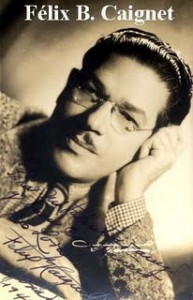The Father of Radio Shows Was Born in Santiago de Cuba

The Excelencias Group brings you closer to an outstanding figure in the realm of radio shows in Santiago de Cuba, and years later in all Latin America. Described as the father of radio shows, Felix Benjamin Caignet Salomon was born on March 31, 1892, in San Luis.
Click on Santiago de Cuba: A City of 500 Years
Felix B. Caignet, as the audience got to know him, was a descendant of French people and grew up in coffee plantations and estates. He was very young when his family moved from Santa Rita de Burene to Santiago de Cuba. His narrative skills were developed in this magic city, where he was surrounded by picturesque personages that told him stories of their ancestors with a touch of suspense.
He had a fruitful life as a poet, journalist, writer, narrator, songwriter, singer, actor and painter; based on his self-taught skills.
In 1914 he entered the journalism world with reports on the court of the former Judiciary of Santiago de Cuba, while he was also writing poems, children tales and comics. Such popular media as El diario de Cuba, El Fígaro, Bohemia and El Sol published his works.
Many people still recall his first steps in the radio realm with the fantastic episodes of Chinese detective Chan Li Po, the crime radio series broadcasted in Cuba in 1934 by radio station CMKD. The introduction of a narrator as part of the show was another merit of the series, but he had previously put out Chilín y Bebita, for children.
In 1948 fame and success crowned Felix Benjamin Caignet’s life. For the first time ever, a radio series was broadcasted at national and Latin American level: “El derecho de nacer”; which soon became a paradigm that stands in our days and established a narrative style based on "speaking in metaphors” as a way to touch the audience’s sensitivity. “El derecho de nacer” has been adapted to the movies and television by prestigious producers.
Other radio series consolidated the emerging genre, such as Aladino y la lámpara maravillosa (1941), El precio de una vida (1944), El ladrón de Bagdad (1946), Peor que las víboras (1946), Ángeles de la calle (1948), Pobre juventud (1957), La madre de todos (1958), Amistad con H and Pero nació, the two last ones were unfinished because he passed away on May 25, 1975.
Caignet succeeded on the radio thanks to the use of suspense and false suspense, didactic elements, episodes, different genres targeting all publics and, of course, his prodigious imagination.
Another facet in the proliferous life of the outstanding creator was made up of his musical creations that included different genres of popular music. Among the titles that still remain on the collective memory we can mention Te odio, Mentira, Carabalí, Montañas de Oriente, Quiero besarte, Mentira, En silencio, Frutas del Caney, which might be the most famous of all. In 1932, the song entitled “El ratoncito Miguel” was premiered at Rialto Theater for children.
The “hot land” proudly has Felix Benjamin Caignet Salomon as a pioneer of radio in Cuba and creator of Latin American soap opera.Those who have studied his work describe him as an “authentic innovator of radio drama” that stood “as a flagship of Cuban radio, specifically Santiago’s.”














